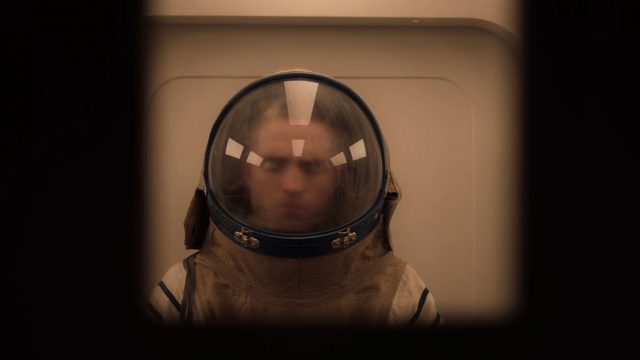High Life: I Can Feel It, by David Bax

Robert Pattinson’s gift as an actor is that he doesn’t just imply, with his bearing and the architectural wonder of his face, that his characters have a subconscious; he does so in such a way that we think we’ve noticed it before he has. He doesn’t just have a relationship with the audience, he has individual relationships with each member of it. This sense of intimacy is probably what has inspired so much devotion among his fans. It’s also what makes him perfect for Claire Denis’ High Life, a movie so forthrightly intimate and closely studied that Pattinson need only color a few hairs gray to suggest the passage of the years over which it takes place.
On a spaceship that looks like a shipping container, hurtling through deep space at nearly light speed, Monte (Pattinson) is one of a handful of death row inmates given the chance to extend their lives by signing up for a mission to a distant black hole. On the way, fertility experiments are conducted on the ship’s damned crew by Dr. Dibs (Juliette Binoche), herself every bit the murderer the rest of them are. As High Life begins, though, we are introduced to Monte years into the expedition, when the only people left alive are him and his infant daughter, Willow.
Much of High Life’s first act is concerned with parenthood. Through flashbacks, we learn a little about who Monte was on Earth and why he was sentenced to death but we meet him at a time when his newfound fatherhood is forcing him to distill his own essence and find out who he really is. His efforts to reduce the ship’s energy consumption are to help prolong the livability of the craft for him and his child but they’re also a metaphor for paring away what is unnecessary and living your life with a clarified purpose.
Monte also has to undertake another hallmark of parenthood, passing on what you’ve has learned from life to the next generation. Again, the specifics of High Life’s setting focus the metaphor, as Monte is the only person Willow knows and maybe will ever know or be able to learn from. This is a horror movie, as evidenced by the way, once we flash back to the mission, we see the other prisoners die off one by one, in sometimes disturbing ways. But the most horrific element of the story is the one that must be left unsaid. Early on, Monte teaches Willow about the concept of taboos but, fittingly, doesn’t mention the one that Denis spends the rest of the movie hinting at. This father and daughter are the only vestiges of the human race for trillions of miles in any direction or, for all they know, anywhere in the universe.
Denis never literally raises the topic of incest. She simply spends most of High Life fixated on sexual impulses, reproductive impulses and where the two do and do not overlap. The crew often display a palpable physical longing for one another. And, with Dr. Dibs constantly collecting samples from the men, the ship seems to almost literally run on semen. The wetness, heat and stickiness of sex exude from the screen, as does a sense of irony at all these primitive impulses so far from where human life began. Binoche’s long, thick hair seems almost impossibly sensual in such an airless place. Pattinson’s opaque narration comments on the stench and how it makes him hard.
Yet Denis is not resistant to the more spiritual, ethereal opportunities her science fiction premise presents. High Life possesses the same awe at cosmic generations at the furthest reaches of space and time as Stanley Kubrick’s 2001 did. Only, in this daring and vigorous work of ugly beauty, HAL 9000 is replaced with a masturbation chamber called the “fuck box.”





























